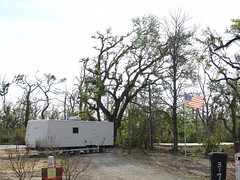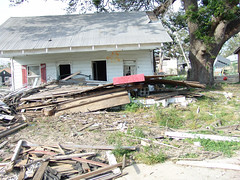Another Perspective on Katrina Aftermath
Here is an interesting article I came across this evening in my quest to figure out why things are the way the are in the hurricane damaged areas.
Another perspective:
Where Are the Black People Offering Relief?
By Sasha Vann
Black College WireSince Hurricane Katrina hit last August, many of us have moved on with our lives.
But not those in the Gulf Coast region. I bore witness.
Spring Break 2006 gave many college students the opportunity to see firsthand the damage created by a storm that changed the face of America.
Katrina on the Ground, a project sponsored by several grass-roots organizations, allowed black college students a chance to help an area where the large African American population was devastated. March 12-17 gave us the opportunity to help. But we didn’t expect the surprise.
With all the allegations of injustices delivered to African Americans in the United States, I figured that the NAACP, the Universal Negro Improvement Association and other black-focused groups had been in Mississippi and Alabama with one fist in the air, the other dragging limbs.
Nope.
Everyone we met in those areas looked at us with wide eyes like we were the second coming of Christ. All we heard for an entire week was that we were the first group of black people that they had seen in the area and that they were so grateful for our help.
My question was, “where in the hell is everyone else?” Then I realized something that struck me as just plain ridiculous.
I knew of no relief provided by our own.
Our own, as in the people who looked like those who had been exploited, making national headlines without national help.
Our own, as in those who lived in the Ninth Ward of New Orleans and are still recovering body parts from hidden corners on the streets.
Our own, as in those who, trapped in the capitalistic constraints of America, couldn’t look to their democratic government to provide shelter and medicine at the height of the storm.
It took walking into a volunteer center to see that what the residents spoke as truth was only a part of this realization. Walking onto that field in Biloxi, Miss., was like stepping onto Duke University’s campus.
Don’t get me wrong. Relief efforts should not be segregated. In a catastrophe of this scale, I applaud anyone who works in the gulf.
But I must say I am disgusted by the lack of initiative taken by the black community.
So what have we been doing?
I mean, while the rest of America sat in front of the television for the three weeks after the storm, those directly affected watched their lives flow down the new rivers in their neighborhoods.
They watched their so-called government pass over them like roadkill. They watched their family members die hopelessly in front of them.
And so did black America.
We, the African American population who represent those disproportionately affected by the storm, witnessed the atrocities. Due to the inadequacies of the Red Cross and FEMA, many of us saw how masses were taken away on the back of trucks, only to be dropped off in locations more chaotic and severe than the place they left.
People, please understand that we are doing an injustice to ourselves by not helping our people. Yes, the media over-romanticized New Orleans and completely dismissed Mississippi and Alabama, places where people are still living in tents and dead bodies are turning up in houses.
I ask three questions:
What is wrong with us?
What are we waiting on?
And why can we not ever seem to help ourselves?
The organization that we worked alongside was called Saving Ourselves, or S.O.S., which did a profound job in supplying the volunteers with food and shelter during our stay.
However, the denial of help to other black people when we can clearly devote the time, energy and money is strictly murder.
I need for the fratricide to stop.
Really.
Posted April 3, 2006



